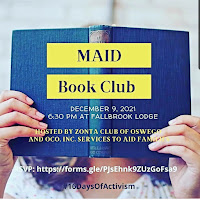by Nancy Schwartzman with Nora Zelevansky,
2022, 283 pages, hardback, e-book, and audiobook. A documentary version was released in 2018.
In this compelling account,
filmmaker Schwartzman focuses on an August 2012 high school party where several
members of the Steubenville football team sexually assaulted an unconscious
(drunk and possibly drugged) teenage girl, filmed the assault on their phones
and live-tweeted about it.
Schwartzman spent three years in
the town documenting the case and its consequences. She interviewed everyone
involved, read police reports and trial transcripts, and viewed social media
posts. She explored the role high school football played in this struggling
rust belt town.
She clearly shows that rape
culture (“boys will be boys), victim blaming, and institutional complicity are
the rule rather than the exception in too many places. She believes that there
has been progress in the ten years since the assault, but we still have far to
go. “We have a chance to learn from our mistakes, call in a diversity of
voices, and protect future generations. But first we have to be willing to take
a hard look at the unconscious, entrenched behaviors that allow this type of
culture to flourish.” A well-documented account of a crime without punishment
as violence against women continues.
A related, excellent book is She
Said by Jodi Kantor & Megan Twohey.








